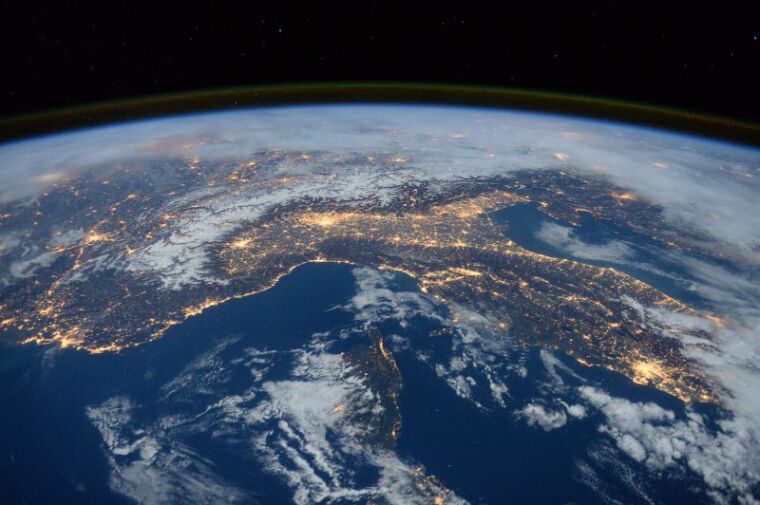Is an astrophysicist trying to 'hide' an argument for God?

BOSTON (Christian Examiner) – A senior astrophysicist at the Harvard-Smithsonian Center for Astrophysics has claimed human beings and the earth are, in fact, "cosmically special."
Howard A. Smith, also a lecturer in Harvard University's Department of Astronomy, writes in the Washington Post that the odds of our universe existing by happenstance are infinitesimal.
"The universe, far from being a collection of random accidents, appears to be stupendously perfect and fine-tuned for life. The strengths of the four forces that operate in the universe — gravity, electromagnetism, and the strong and weak nuclear interactions (the latter two dominate only at the level of atoms) — for example, have values critically suited for life, and were they even a few percent different, we would not be here," Smith writes.
Smith rejects famed scientist Carl Sagan's claim that humanity lives "on an insignificant planet of a humdrum star," and Stephen Hawking's pointed assertion that human beings are just "chemical scum on a moderate-sized planet."
The universe, far from being a collection of random accidents, appears to be stupendously perfect and fine-tuned for life. The strengths of the four forces that operate in the universe — gravity, electromagnetism, and the strong and weak nuclear interactions (the latter two dominate only at the level of atoms) — for example, have values critically suited for life, and were they even a few percent different, we would not be here.
Smith argues the opposite. Earth and its celestial neighborhood are special – a part of the "big bang creation" that if altered the slightest bit would preclude life in our sector of space. Smith writes that he is aware there will be objections to this claim.
"The frequent response from physicists offers a speculative solution: an infinite number of universes — we are just living in the one with the right value. But modern philosophers such as Thomas Nagel and pioneering quantum physicists such as John Wheeler have argued instead that intelligent beings must somehow be the directed goal of such a curiously fine-tuned cosmos," Smith writes.
Intelligence, and the intelligence of human beings specifically, is "not easy to produce," he adds. In fact, the ingredients for life are much more complex that the liquid water and "pleasant environment" in the right zone of the universe scientists often speak about. There must be a stable environment for billions of years, and there must also be DNA, the evolution of which many scientists believe was accidental.
Smith writes then that intelligence is something special – something "astronomically unlikely," especially if the chances of life forming on other planets is so slim.
"If the combined astronomical, biological and evolutionary chances for life to form and evolve to intelligence are only 1 in 10 million, then we probably have no one to talk to," Smith writes. We are likely alone and unique, after all.
"For all intents and purposes, we could be alone in our cosmic neighborhood, and if we expand the volume of our search we will have to wait even longer to find out. Life might be common in the very distant universe – or it might not be – and we are unlikely to know. We are probably rare – and it seems likely we will be alone for eons."
Smith's assertions cut against the grain of traditional science. His colleagues, he said, "strongly reject this notion." They follow scientists like Hawking, who said he does not believe "the whole universe exists for our benefit."
To that, Smith argues "beliefs are not proof."
Observations of the universe to date, he writes, are "consistent with the idea that humanity is not mediocre at all and that we won't know otherwise for a long time. It seems we might even serve some cosmic role."
Smith, who was also a visiting scientist at NASA for three years and has more than 250 scholarly publications to his name, writes and lectures on the relationship between science and religion. An observant Jews, he is the author of Let There Be Light: Modern Cosmology and Kabbalah, A New Conversation Between Science and Religion.
Kabbalah is Jewish mysticism, though its proponents claim it is "wisdom" that isn't specifically Jewish, Christian, or any other religion.
Jerry Coyne, a professor Ecology and Evolution at the University of Chicago and author of the books Why Evolution is True and Faith vs. FACT: Why Science and Religion are Incompatible, is scandalized by Smith's claims in the Washington Post.
In fact, he accuses Smith of attempting to hide the fact in the article that he is an observant Jew.
"[T]he religion part is completely missing from Smith's op-ed in Friday's Washington Post, 'Humanity is cosmically special. Here's how we know.' Or rather, the religion is implied, but is only implicit for reasons we can guess: instead of confessing his beliefs at the outset, Smith tries to use science to show that humans are 'special,' and that, perhaps, there's a Higher Intelligence behind the presence of humans on Earth," Coyne writes.
In particular, Coyne pounces on Smith's idea that human beings may serve a "cosmic role" and are "cosmically precious."
"Those very phrases imply that there's a playwright behind our evolution, and for Smith that's surely Yahweh" [the God of the Bible]."
"So what we have here is an op-ed in a prominent newspaper that uses dubious and erroneous arguments to claim that humans were designed. But those arguments don't stand up in light of what physicists and biologists – at least those not already committed to a religious explanation – understand about our cosmos. There is no compelling argument that we serve any cosmic role, or that any Designer is behind physical law and human evolution," Coyne claims in his counter-argument.
He claims Smith is deliberately "trying to hide his argument for God."